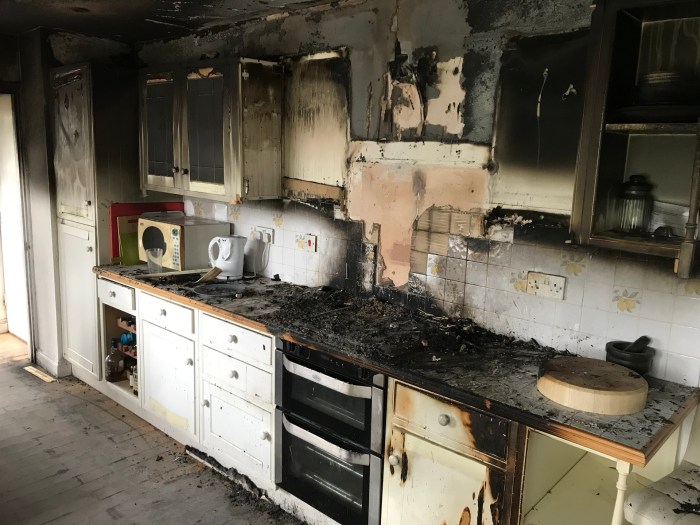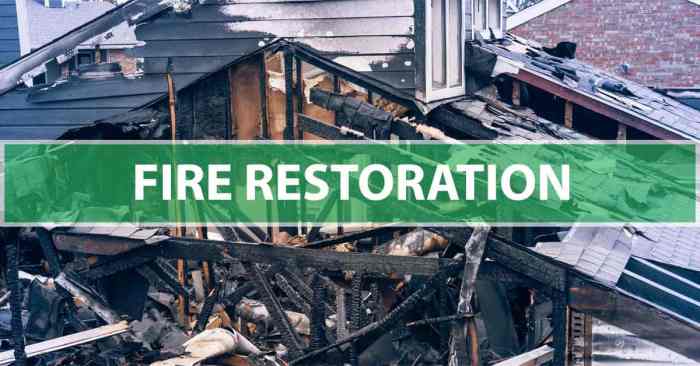Embarking on the journey of fire damage restoration services, we delve into a world where swift action is paramount, expert intervention is crucial, and long-term benefits are abundant. Join us as we explore the intricacies of restoring spaces ravaged by fire incidents.
Importance of Fire Damage Restoration Services

After a fire incident, immediate action is crucial to prevent further damage to your property. The longer you wait to address the aftermath of a fire, the more extensive and costly the repairs can become.
Professional restoration services play a vital role in minimizing damage caused by fire. These experts have the knowledge, experience, and tools necessary to assess the situation accurately and implement effective restoration techniques.
Long-Term Benefits of Hiring Experts
- Preventing Secondary Damage: Professionals can quickly identify hidden issues that may lead to mold growth, structural damage, or other problems if not addressed promptly.
- Efficient Restoration: Expert technicians can efficiently clean, repair, and restore your property, ensuring a faster and more thorough recovery process.
- Insurance Claim Assistance: Restoration companies can help you navigate the insurance claim process, ensuring that you receive fair compensation for your losses.
- Peace of Mind: Knowing that your property is in the hands of skilled professionals can provide peace of mind during a stressful and challenging time.
Process of Fire Damage Restoration
When it comes to fire damage restoration, it is crucial to follow a systematic process to ensure that the affected property is restored effectively and efficiently. Here is an overview of the step-by-step process followed by restoration services:
Assessment of Damage
Before beginning any restoration work, it is essential to assess the extent of the damage caused by the fire. This includes evaluating the damage caused by flames, smoke, and water used to extinguish the fire. A thorough assessment helps in developing a comprehensive restoration plan tailored to the specific needs of the property.
Cleaning Up Soot, Smoke, and Water Damage
Once the damage assessment is complete, the restoration team will start the process of cleaning up soot, smoke, and water damage. This involves using specialized equipment and techniques to remove residue, odor, and moisture from the affected areas. The goal is to restore the property to its pre-fire condition and prevent further damage from occurring.
Restoration and Repairs
After the cleanup process is finished, the restoration team will proceed with repairing and restoring the damaged areas of the property. This may include repairing structural damage, replacing damaged materials, and repainting walls and ceilings. The restoration team will work diligently to ensure that the property is safe, functional, and aesthetically pleasing once again.
Final Inspection and Testing
Once the restoration work is completed, a final inspection and testing will be conducted to ensure that the property is fully restored and safe for occupancy. This may involve checking for any lingering odors, verifying the integrity of structural repairs, and testing electrical and plumbing systems.
Only after passing this final inspection will the property be deemed fully restored.
Equipment and Tools Used in Fire Damage Restoration
When it comes to fire damage restoration, specialized equipment and tools play a crucial role in effectively restoring the property to its pre-fire condition. These tools are specifically designed to handle the unique challenges posed by fire damage, ensuring a thorough and comprehensive restoration process.
1. Air Scrubbers and Dehumidifiers
Air scrubbers and dehumidifiers are essential tools used in fire damage restoration to remove smoke particles, soot, and odors from the air. They help improve indoor air quality and prevent mold growth by reducing humidity levels in the affected area.
2. Thermal Foggers
Thermal foggers are used to dispense deodorizing agents in the form of a fog or mist. This helps neutralize and eliminate smoke odors that may have penetrated various surfaces in the property, ensuring a fresh and clean environment after restoration.
3
. HEPA Vacuums
HEPA vacuums are equipped with high-efficiency particulate air filters that can capture even the smallest particles, including soot and smoke residue. These vacuums are used to thoroughly clean surfaces and remove contaminants left behind by the fire, promoting a healthier living space.
4. Ozone Generators
Ozone generators are powerful tools that produce ozone gas to break down smoke molecules and eliminate odors at the molecular level. They are effective in removing stubborn smoke odors from carpets, upholstery, and other porous materials, ensuring a complete restoration of the property.
5. Moisture Meters and Infrared Cameras
Moisture meters and infrared cameras are used to detect hidden moisture within walls, ceilings, and floors. By identifying areas of moisture intrusion, restoration professionals can prevent mold growth and structural damage, ensuring a thorough and effective restoration process.
6. Commercial-Grade Cleaning Agents
Professional-grade cleaning agents are used to clean and sanitize surfaces affected by fire damage. These specialized cleaning agents are formulated to remove soot, smoke residue, and odors effectively, restoring the property to a safe and habitable condition.
Health and Safety Considerations During Restoration

When it comes to fire damage restoration, health and safety considerations are of utmost importance to ensure the well-being of both workers and residents involved in the process.
Health Risks Associated with Fire Damage and Cleanup
- Smoke and soot inhalation can lead to respiratory issues and aggravate existing conditions like asthma.
- Exposure to harmful chemicals and toxins released during a fire can cause skin irritation and other health problems.
- Mold growth due to moisture from firefighting efforts can pose serious health risks if not properly addressed.
Safety Measures Followed by Restoration Professionals
- Wearing appropriate personal protective equipment (PPE) such as masks, gloves, and goggles to prevent exposure to harmful substances.
- Ensuring proper ventilation during cleanup to minimize the inhalation of toxic fumes and improve air quality.
- Implementing safe handling and disposal procedures for hazardous materials to prevent further health risks.
Ensuring a Safe Environment for Workers and Residents
- Thoroughly assessing the extent of damage and potential hazards before starting the restoration process.
- Following industry guidelines and best practices to maintain a safe working environment for restoration professionals.
- Regular monitoring of air quality and environmental conditions to ensure the safety of both workers and residents during and after restoration.
Epilogue
In conclusion, fire damage restoration services stand as a beacon of hope in the aftermath of devastation, offering not just restoration but also peace of mind. As we navigate through the process, remember that professional expertise and advanced tools pave the way for a brighter, safer tomorrow.
FAQ
How soon should I contact fire damage restoration services after a fire?
It is crucial to contact restoration services immediately to prevent further damage and begin the restoration process promptly.
What are the health risks associated with fire damage cleanup?
Health risks include exposure to toxic fumes, soot inhalation, and potential mold growth if not handled properly.
Do restoration professionals ensure the safety of residents during the cleanup?
Yes, professionals follow strict safety protocols to ensure the safety of both workers and residents throughout the restoration process.









